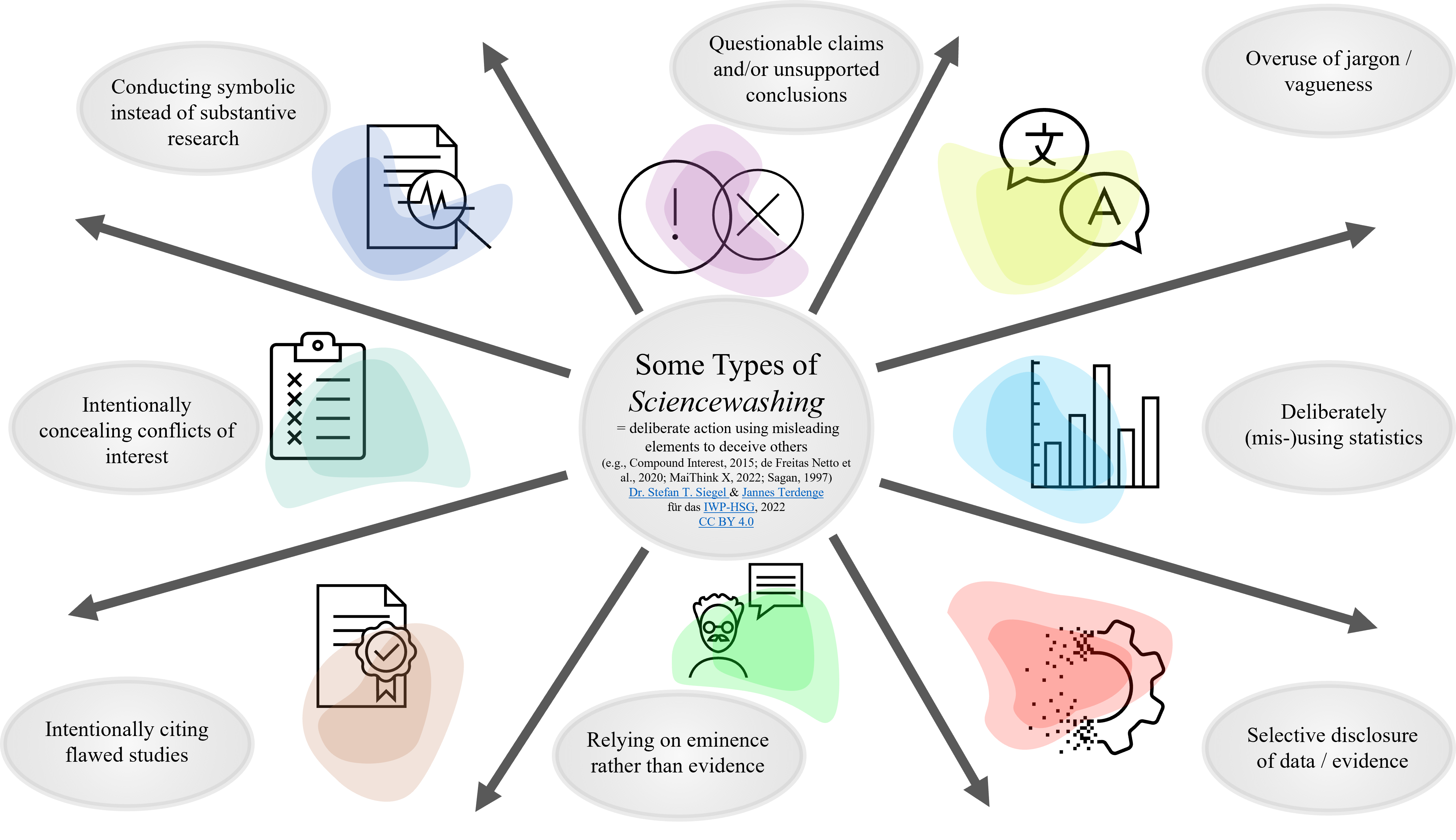Sciencewashing is a deliberate action to simulate scientific practices or quality assurance to deceive others. It occurs in various areas, e.g., the beauty marketing or the nutritional supplement industry. In this guest article, Stefan T. Siegel and Jannes Terdenge elaborate on the question of what sciencewashing is and why it can be a challenge for science communication.
The Fine Art of Detecting Sciencewashing: Definition, Consequences, Forms & Prevention
A skincare company claims that its anti-aging cream can reduce wrinkles and improve skin elasticity. However, the research cited does not support these claims, and the cream’s ingredients are in such small quantities that they are unlikely to have any significant effect.
In her television science show MAITHINK X from 9. October 2022, science communicator Dr. Mai Thi Nguyen-Kim, revealed some of the ‘tricks of the cosmetics industry’. During her show, she pointed out that the cosmetics market is full of scientific-sounding advertising promises1. It is not entirely clear, to what extent these claims are backed up by solid studies or in other words to what extent they are forms of sciencewashing or even scientific misconduct2.
This tactic occurs in different areas such as nutrition, healthcare, or politics in various forms (see actual examples uncovered: Quarks Science Cops). Individuals or companies may employ practices of sciencewashing for a variety of reasons, for instance, to differentiate their product from competitors and make it appear more credible and trustworthy. In general, sciencewashing is a means to gain an unfair advantage in the marketplace that can have problematic consequences for various stakeholders.
Accordingly, we elaborate on the question of what sciencewashing is, why it is problematic, which forms there are, and how to deal with it – also concerning science communication.
What is Sciencewashing?
While there is an increasing body of research on the phenomenon of greenwashing, its forms, consequences, and possibilities of prevention34, research on sciencewashing is still limited. Although various forms exist, in a nutshell, greenwashing is a «deliberate […] action with the presence of misleading elements, focused on the deception of stakeholders»5.
Acknowledging its various forms, we similarly and preliminarily define sciencewashing as a «deliberate action to simulate scientific practices or quality assurance to deceive others».
Why is Sciencewashing Problematic?
Sciencewashing can be problematic in several ways as it can have negative consequences for individuals, organizations, and society. It can, for instance, mislead individuals and organizations into believing that ideas or products are backed by scientific evidence when they are not6. Besides, it can promote myths, i.e., misconceptions about science, for instance its potentials and limits.
Engaging in sciencewashing can be problematic for the employing company as it can for instance damage the company’s reputation and trustworthiness if it is discovered (backfire effect). It can lead to a loss of customers and legal issues if the company is engaged in fraudulent practices. Additionally, engaging in sciencewashing can create a toxic work environment if employees are expected to support ideas or products that are not based on solid research. This can lead to morale problems and high turnover among employees.
On a larger scale, sciencewashing can undermine public trust in science by giving the appearance of legitimacy to ideas or products that are not based on sound scientific evidence. Especially in today’s fast-paced world, which is characterized by an abundance of information, it might get more and more difficult for laypersons and novices to separate fact from fiction respectively sound science from pseudoscience78.
Forms of Sciencewashing
We propose several forms of sciencewashing, including the selective disclosure of data, i.e., the cherry-picking of results or studies that support a particular argument or perspective while ignoring or downplaying conflicting evidence. Analogous to typical forms greenwashing9 and in line with Compound Interest’s guide10 on how to spot bad science, and Carl Sagan’s (1997) recommendations on how to detect baloney, we’ve created the following (interactive) graphic. It covers eight common – to some extent disjunct – types of sciencewashing. By clicking on the interactive tags, you will find an explanation and an example for each form. Please note that this is not a comprehensive overview, but a starting point for understanding.

How to Deal with Sciencewashing?
Given its potentially negative consequences for various stakeholders, the question arises of how individuals and organizations can or should deal with sciencewashing. Science communication can play here a crucial role: Science communicators can, firstly, inform others about the forms, causes, consequences of science washing. Secondly, it can equip them with the right tools to recognize the different forms of sciencewashing. Using the “baloney detection kit” — a set of cognitive tools against pseudoscience, that Carl Sagan describes in his seminal book chapter “The Fine Art of Baloney Detection”11 can be very beneficial. Some of his tools for critical thinking are:
‘Wherever possible there must be independent confirmation of the facts. […]
Arguments from authority carry little weight — authorities have made mistakes in the past. They will do so again in the future. Perhaps a better way to say it is that in science there are no authorities; at most, there are experts. […]
Always ask whether the hypothesis can be, at least in principle, falsified. Propositions that are untestable, unfalsifiable are not worth much’12.
In a nutshell, the best way to deal with sciencewashing is to approach claims and products with a healthy dose of skepticism. We encourage you to ask critical questions, seek out evidence from credible sources and pay attention to context and nuance. In doing so, you can spot bad science and better distinguish between fact and fiction.
- MAITHINK X, (2022): Die Tricks der Kosmetikindustrie: Science Washing. [The tricks of the cosmetics industry: Science Washing.] https://www.zdf.de/show/mai-think-x-die-show/maithink-x-folge-15-100.html ↩︎
- Siegel, S. T., & Daumiller, M. (2020). Ist das Vertrauen in die Wissenschaft dahin? – Betrug und Fehlverhalten in der Wissenschaft [Is trust in science gone? – Fraud and misconduct in science]. In S. T. Siegel & M. Daumiller (Hrsg.), Wissenschaft und Wahrheit: Ursachen, Folgen und Prävention wissenschaftlichen Fehlverhaltens [Science and truth: causes, consequences and prevention of scientific misconduct] (p. 11–22). Budrich. ↩︎
- de Freitas Netto, S. V., Sobral, M. F. F., Ribeiro, A. R. B., & Soares, G. R. da L. (2020). Concepts and forms of greenwashing: A systematic review. Environmental Sciences Europe, 32(1), 19. https://doi.org/10.1186/s12302-020-0300-3 ↩︎
- Nemes, N., Scanlan, S. J., Smith, P., Smith, T., Aronczyk, M., Hill, S., Lewis, S. L., Montgomery, A. W., Tubiello, F. N., & Stabinsky, D. (2022). An Integrated Framework to Assess Greenwashing. Sustainability, 14(8), 4431. https://doi.org/10.3390/su14084431 ↩︎
- de Freitas Netto, S. V., Sobral, M. F. F., Ribeiro, A. R. B., & Soares, G. R. da L. (2020). Concepts and forms of greenwashing: A systematic review. Environmental Sciences Europe, 32(1), 19. https://doi.org/10.1186/s12302-020-0300-3 ↩︎
- Quarks Science Cops (2022). Quarks Science Cops. Podacst website: https://www.quarks.de/science-cops/ ↩︎






